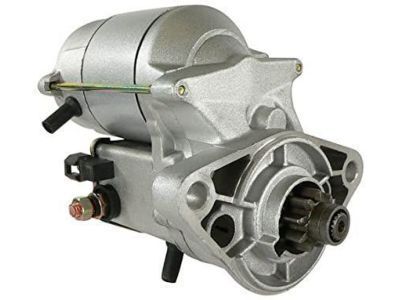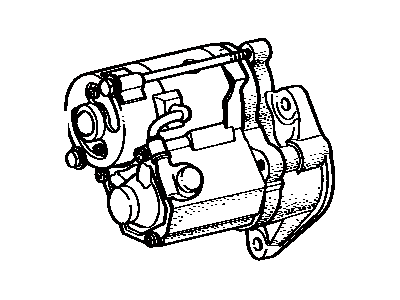

My Garage
My Account
Cart
Genuine 1987 Toyota Supra Starter Motor
Starter Ignition- Select Vehicle by Model
- Select Vehicle by VIN
Select Vehicle by Model
orMake
Model
Year
Select Vehicle by VIN
For the most accurate results, select vehicle by your VIN (Vehicle Identification Number).
1 Starter Motor found
- Product Specifications
- Other Name: Starter Assy
- Replaced by: 28100-45050-84
- Part Name Code: 28100
- Item Weight: 15.20 Pounds
- Item Dimensions: 13.7 x 6.2 x 6.2 inches
- Condition: New
- Fitment Type: Direct Replacement
- SKU: 28100-45050
- Warranty: This genuine part is guaranteed by Toyota's factory warranty.
1987 Toyota Supra Starter Motor
With ToyotaPartsDeal.com, you have access to an extensive inventory of genuine 1987 Toyota Supra Starter Motor, all priced competitively. Feel secure in your purchase, as all our OEM 1987 Toyota Supra Starter Motor are covered by the manufacturer's warranty. Plus, we offer a hassle-free return policy and speedy delivery service.
1987 Toyota Supra Starter Motor Parts Questions & Experts Answers
- Q: What should you check before diagnosing Starter Motor problems for the 1987 Toyota Supra?A: Before diagnosing starter problems, ensure the battery is fully charged. If the starter motor does not turn when the switch is operated, check that the shift lever is in Neutral or Park for automatic transmissions or that the clutch pedal is depressed for manual transmissions. Confirm the battery is charged and that all cables at the battery and starter solenoid terminals are clean and secure. If the starter motor spins but the engine does not crank, the over-running clutch in the starter motor is slipping, necessitating replacement of the starter motor. If the starter motor does not operate at all but the solenoid clicks when the switch is actuated, the issue may be with the battery, the main solenoid contacts, or the starter motor itself, or the engine may be seized. If the solenoid plunger cannot be heard when the switch is actuated, the battery may be bad, the fusible link may be burned, or the solenoid itself may be defective. To check the solenoid, connect a jumper lead between the battery positive and the ignition switch wire terminal on the solenoid; if the starter motor operates, the solenoid is functioning, indicating a problem with the ignition switch, neutral start switch, or wiring. If the starter motor still does not operate, remove the starter/solenoid assembly for disassembly, testing, and repair. If the starter motor cranks the engine at an abnormally slow speed, ensure the battery is fully charged and that all terminal connections are tight. A partially seized engine or incorrect oil viscosity in cold weather can cause slow cranking, and the battery's Cold Cranking Amp rating should be verified for sufficiency. Run the engine until it reaches normal operating temperature, then disconnect the coil wire from the distributor cap and ground it on the engine. Connect a voltmeter positive lead to the positive battery post and the negative lead to the negative post; a fully charged battery should read about 12.6 volts. If the reading is lower, charge the battery before proceeding. Crank the engine and take voltmeter readings as soon as a steady figure is indicated, avoiding more than 15 seconds of starter motor operation at a time. A reading of 9 volts or more with normal cranking speed is acceptable; if the reading is 9 volts or more but cranking speed is slow, the solenoid contacts may be burned, there could be a bad connection, or the starter motor may be faulty. If the reading is less than 9 volts and cranking speed is slow, the starter motor may be bad or the battery may be discharged.










